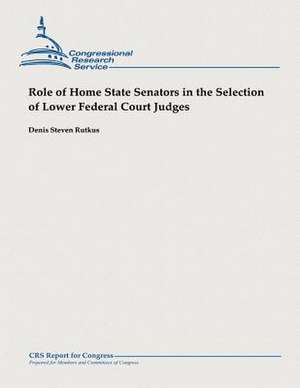Role of Home State Senators in the Selection of Lower Federal Court Judges
Autor Denis Steven Rutkusen Limba Engleză Paperback
| Toate formatele și edițiile | Preț | Express |
|---|---|---|
| Paperback (2) | 121.87 lei 3-5 săpt. | |
| CREATESPACE – | 121.87 lei 3-5 săpt. | |
| Nova Science Publishers Inc – 31 oct 2008 | 289.76 lei 3-5 săpt. |
Preț: 121.87 lei
Nou
Puncte Express: 183
Preț estimativ în valută:
23.32€ • 24.26$ • 19.25£
23.32€ • 24.26$ • 19.25£
Carte disponibilă
Livrare economică 24 martie-07 aprilie
Preluare comenzi: 021 569.72.76
Specificații
ISBN-13: 9781482764970
ISBN-10: 1482764970
Pagini: 78
Dimensiuni: 216 x 279 x 4 mm
Greutate: 0.2 kg
Editura: CREATESPACE
ISBN-10: 1482764970
Pagini: 78
Dimensiuni: 216 x 279 x 4 mm
Greutate: 0.2 kg
Editura: CREATESPACE
Cuprins
Preface; Introduction; Background and Origins of Senators Recommending Role; The Senates Exercise of "Advice and Consent"; Role for Senators in Selecting Nominees Linked to Their States; Senatorial Courtesy; Blue Slip Policy of Senate Judiciary Committee; Senators Party Affiliations and Their Recommending Role; When One Senator Is of the Presidents Party; When Both Senators Are of the Presidents Party; When Neither Senator Is of the Presidents Party; The Customary Model: Officials in the State Who Are of the; Presidents Party Play the Primary Recommending Role; Exceptions to the Customary Model, Where Senators Play a Primary Recommending Role; Lesser Role for Senators When Recommending Circuit Court Candidates; Selecting Judicial Candidates to Recommend; Learning of the Vacancy; Relationship with the Other Home State Senator; First Option: Only One Senator Would Be Actively Involved in Selecting Judicial Candidates; Second Option: The Two Senators Apportion between Themselves the Selection of Candidates; Third Option: The Two Senators Work Together in Selecting Each Candidate; Criteria Used to Select Judicial Candidates; Procedures Used to Identify and Evaluate Candidates; Interaction with Administration During Nominee Selection Process; Administration Entities and Their Roles; Clarifying the Senators Role; Consultation at Different Stages of the Process; When a Nominee Is Selected against the Advice of, or Without Consulting, a Senator; Option of Opposing the Nomination in Committee or on the Senate Floor; Option of Not Opposing the Nomination; Current Issues and Concluding Observations; Wide Acceptance of Importance of Pre-Nomination Consultation; Recent Controversies over Administrations Consultation with Senators; Specific Issues Concerning the Recommending Role of Home State Senators; What Constitutes Good Faith or Serious Consultation?; Should Home State Senators Always Have the Opportunity to Provide Their Opinion of a Judicial Candidate Before He or She Is Nominated?; How Differently Should the Administration Treat the Input of Senators, Depending on Their Party Affiliation?; What Prerogatives Should Home State Senators Have in the Selection of Circuit Court Nominees?; Should the Policy of the Judiciary Committee Allow a Home State Senator to Block Committee Consideration of a Judicial Nominee?; Consultation Between the President and Home State Senators in the Current Environment; Index.
